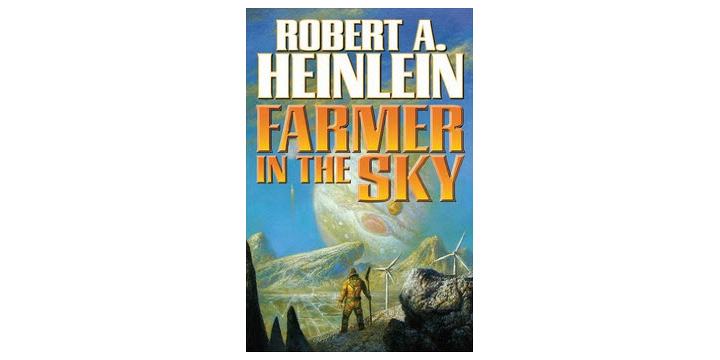Robert Heinlein’s Farmer in the Sky is one of my comfort books. It caught my imagination in the 70’s when I was a youth. The images and feelings stayed with me throughout the years. Since my first reading of this book I have read best sellers such as Silence of the Lambs, classical masterpieces such as Moby Dick, and scholarly works such as the Rhetoric of Fiction, but none of them have had more emotional and imaginative staying power than this little science fiction novel from the 50’s.
Science fiction is usually about ideas. Arguably, characters tend to take a secondary role in science fiction to the philosophical or scientific ideas that drive the book. Unlike in Henry James’ Portrait of a Lady where the plot moves like a glacier and we delve deep into the minds and souls of the characters, in science fiction the characters exist mainly to showcase the ideas. We have the Frankenstinian theme in Blade Runner and the idea of security versus freedom in the Giver. Heinlein seems to meld the two forms together in Farmer in the Sky. While we don’t do any deep soul exploration he brings us characters that are familiar and who think the way we do. Mind you the world in the book is far in the future now as when it was written some sixty years ago, yet if we met Bill or George today we would not be alarmed in any way. George and Bill are father and son. Molly and Peggy are his step-mother and sister. They are a family that harks to the past instead of the future. That’s a rarity in science fiction.
Where does the science fiction come in? Earth is overpopulated—a common theme in science fiction—so this family is going to emigrate to Ganymede, one of Jupiter’s moons. While there are many examples of science in science fiction that has been realized today, the science behind terraforming still eludes us. Heinlein paints a very satisfying picture of Earth and details the problems and their causes that are leading families like George and Bill’s to emigrate. He throws into the mix Boy Scout field trips to Antarctica where the boys with certifications pilot the aircraft. Great stuff for a kid’s imagination. Where Heinlein differs from other science fiction is that when we get to Ganymede, quite a scientific feat, we end up homesteading. We go through the business of creating a farm with Bill. This being Ganymede makes the business of creating a farm a little different than on Earth, so science fiction is applied, but still we living on the frontier much like Little House on the Prairie. You have to give it Heinlein for putting the image of plowing a field with Jupiter taking up half the sky above into a kid’s head.
Finally, one of the delights of the book is the casual conversational tone in which it is written. Bill, a boy who can’t be more than sixteen-years-old, tells the story as it happens. The language dates the book in what’s to me a wonderful way.
Our troop had been up in the High Sierras that day and we were late getting back. We had taken off from the camp field on time but Traffic Control swung us a way east to avoid some weather. I didn’t like it; Dad usually won’t eat if I’m not home.
Besides that, I had had a new boy shoved off on me as co-pilot; my usual co-pilot and assistant patrol leader was sick, so our scoutmaster, Mr. Kinski, gave me this twerp. Mr. Kinski rode in the other copter with the Cougar Patrol.
This is the language of a time when boys could settle differences with a friendly fist-fight. There are people described as being a “good joe.” We have genuine lines like “I’m not grateful, see” and “Wipe that grin off your face.” The dated language is an unintended motivation for me to read the book as it harks to what appears to me to be a better day.
In the end the book is wholesome science fiction that has lost none of science fiction’s power. I don’t think there is a science fiction writer alive who can successfully write it like this today. Heinlein gives us strong family ties, an immersive future world, Boy Scouts, self-reliance, science out the wazoo, and a sense of the goodness of life. I read it out loud to my fifteen year old son just for the fun of it. The smile remained on his face for a long time after I finished the last word.

